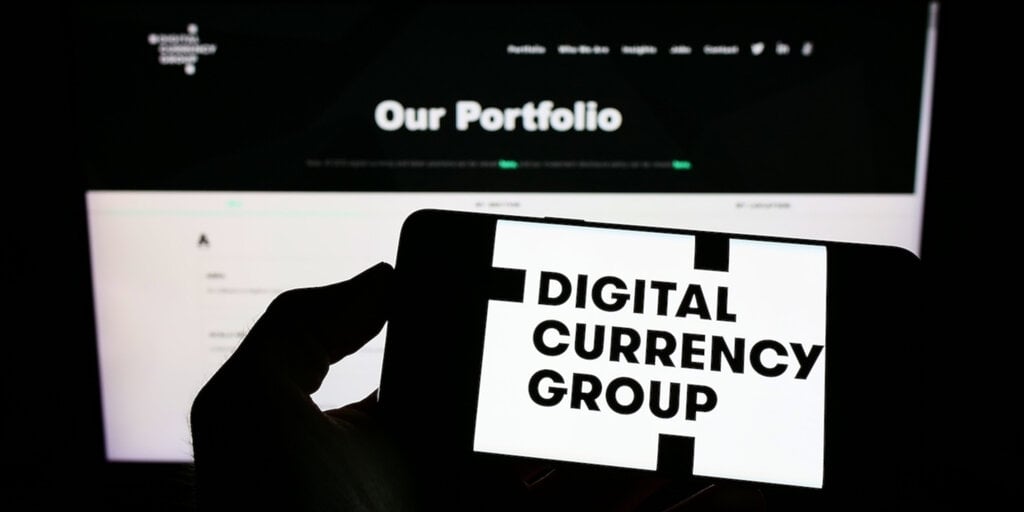Crypto behemoth Digital Currency Group (DCG) is one of the biggest players in the crypto industry.
The conglomerate has roughly 200 companies in its portfolio. One of the best known is Grayscale, manager of the eponymous Grayscale Bitcoin Trust. It’s world’s largest Bitcoin fund which opened the door to institutional investors as a private trust in 2013 and got approval to trade publicly under the GBTC ticker in 2015.
But DCG has run into a lot of trouble since the crypto crash of last year. Genesis Global, its digital asset lender, went bankrupt in January, then last month announced it would cease all operations.
And this week, the New York Attorney General’s office hit DCG, its subsidiary Genesis Global Capital, and crypto exchange Gemini Trust, alleging the companies defrauded customers of $1.1 billion.
Here’s a breakdown of DCG and how it got to where it is now.
2015 — Founding and first fundraiser
DCG was founded in 2015 by Barry Silbert, the ex-CEO and founder of SecondMarket, which is now known as Nasdaq Private Market. The idea, Silbert said at the time, was to have DCG structured like a company—despite it being an entity that invests in Bitcoin companies.
It secured funding from the likes of Bain Capital Ventures, FirstMark Capital, MasterCard, and New York Life when it launched.
January 2016 — Digital Currency Group buys CoinDesk
DCG bought crypto news publication CoinDesk in 2016 for an undisclosed amount. Reports at the time put the deal at around $500,000 to $600,000.
November 2021 — Big investment
DCG secured major investment, with Japanese multinational Softbank leading a $700 million investment round. Google’s parent company Alphabet Inc. also took part.
At the time, Digital Currency Group was valued at $10 billion and SoftBank Group International CEO Marcelo Claure described its shares as “basically the single-best asset that gives us the diversity of exposure to crypto, A-Z.”
April 2021— Plans to turn Bitcoin fund into an ETF announced
Grayscale announces that it plans to turn GBTC, which at the time had $38.8 billion under management, into an exchange-traded fund (ETF)—something investors are hungry for.
“We are 100% committed to converting GBTC into an ETF,” the firm said at the time. It added: “The timing will be driven by the regulatory environment.”
June 2022 — Grayscale sues the SEC
The regulatory environment proved a big challenge for the firm. A year after beginning its efforts to convert GBTC, Grayscale sued the U.S. Securities and Exchange Commission after the regulator had repeatedly denied Grayscale’s application to turn its flagship fund into an ETF.
The firm’s lawyer Donald B. Verrilli, Jr. claimed that the SEC was “acting arbitrarily and capriciously in violation of the Administrative Procedure Act and Securities Exchange Act of 1934” in denying the application.
November 2022 — Genesis announces that it’s stopping withdrawals
Meanwhile, trouble was brewing for Genesis. It had made billion of dollars in loans to several beleaguered firms—Three Arrows Capital and Alameda Research—that were about to default on their debt as a result of market contagion stemming from the collapse of TerraUSD.
By November, when mega digital asset brand FTX collapsed, Genesis announced to clients that it would pause withdrawals from its lending arm due to the “unprecedented market turmoil.” Digital Currency Group then stepped in to give a helping hand with $140 million in equity.
The firm’s lawyer Donald B. Verrilli, Jr. claimed that the SEC was “acting arbitrarily and capriciously in violation of the Administrative Procedure Act and Securities Exchange Act of 1934” in denying the application.
December 2022 — Digital Currency Group’s Gemini troubles
Crypto moguls the Winklevoss twins chimed in because their New York-based crypto exchange Gemini was involved: Genesis served as the primary lending partner of the Gemini Lend program, which helped Gemini USD (GUSD) holders earn interest on their deposits. But when Genesis suspended withdrawals, it owed $900 million to users of the high-yield savings product.
In an open letter to DCG CEO Barry Silbert, Cameron Winklevoss said on Twitter that he was using “bad faith stall tactics.”
Genesis interim CEO Derar Islim responded by asking for more time to sort out the mess.
January 2023 — Genesis collapses, reveals exposure to FTX
Genesis Global Capital filed for bankruptcy protection. It also said that it had exposure to failed crypto company FTX; debtors accused it of being one of the main “feeder funds” to the disgraced exchange.
After, FTX’s new management reached a $175 million settlement with Genesis.
August 2023 — Grayscale win
2023 has been a tough year but it’s not all negative news: a federal judge decided to overturn the SEC’s decision to block Grayscale from converting its Bitcoin trust into a spot ETF.
The ruling was seen as a win for not only Digital Currency but the industry as a whole as a judge essentially sided with the crypto world—and potentially speed up the process of getting a spot Bitcoin ETF approved in the U.S.
September 2023 — Gemini Earn
Digital Currency Group (DCG) announced that Gemini Earn customers could see 95% to 110% recovery on their claims in a bold new deal following months of uncertainty.
“This is a remarkable outcome for any liquidating chapter 11 case, let alone one in the volatile cryptocurrency industry,” the company said in a statement.
2023 — NYAG lawsuit and accusations
Just as it appeared things were being ironed out between Genesis and Gemini, the New York Attorney General’s office hits Genesis Global Capital, Gemini Trust, and Digital Currency Group (DCG) with a lawsuit.
Silbert is mentioned in the lawsuit, which alleges that “these cryptocurrency companies lied to investors and tried to hide more than a billion dollars in losses, and it was middle-class investors who suffered as a result.”
Edited by Stacy Elliott.
Stay on top of crypto news, get daily updates in your inbox.
















